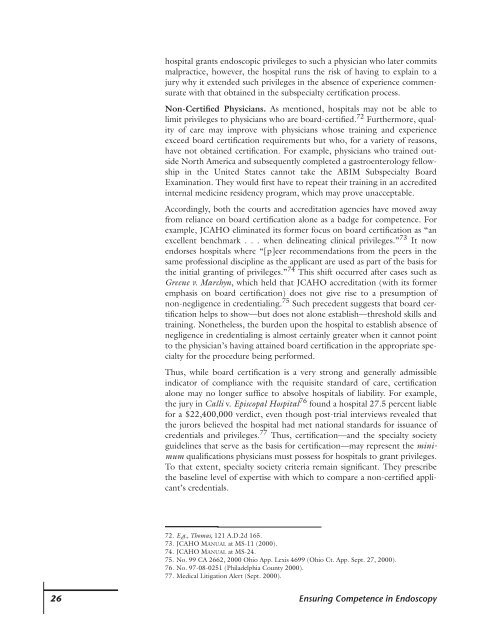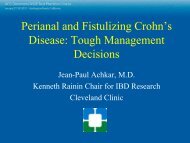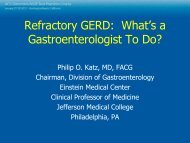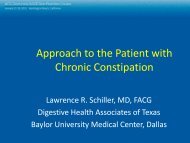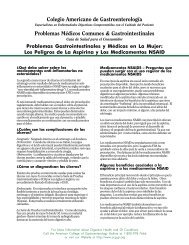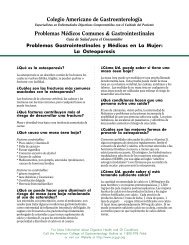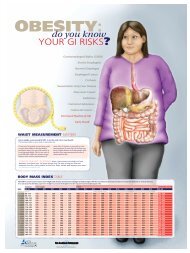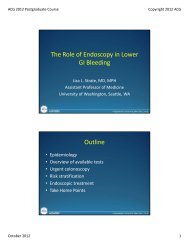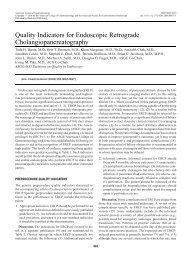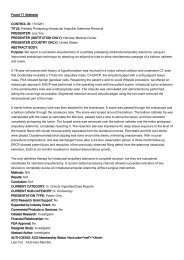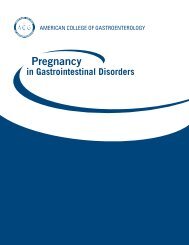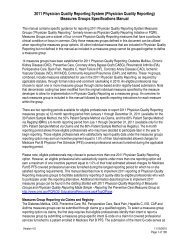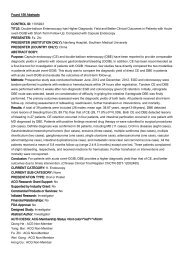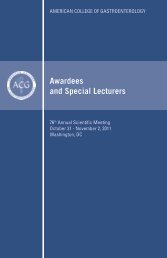Ensuring Competence in Endoscopy - American College of ...
Ensuring Competence in Endoscopy - American College of ...
Ensuring Competence in Endoscopy - American College of ...
You also want an ePaper? Increase the reach of your titles
YUMPU automatically turns print PDFs into web optimized ePapers that Google loves.
hospital grants endoscopic privileges to such a physician who later commits<br />
malpractice, however, the hospital runs the risk <strong>of</strong> hav<strong>in</strong>g to expla<strong>in</strong> to a<br />
jury why it extended such privileges <strong>in</strong> the absence <strong>of</strong> experience commensurate<br />
with that obta<strong>in</strong>ed <strong>in</strong> the subspecialty certification process.<br />
Non-Certified Physicians. As mentioned, hospitals may not be able to<br />
limit privileges to physicians who are board-certified. 72 Furthermore, quality<br />
<strong>of</strong> care may improve with physicians whose tra<strong>in</strong><strong>in</strong>g and experience<br />
exceed board certification requirements but who, for a variety <strong>of</strong> reasons,<br />
have not obta<strong>in</strong>ed certification. For example, physicians who tra<strong>in</strong>ed outside<br />
North America and subsequently completed a gastroenterology fellowship<br />
<strong>in</strong> the United States cannot take the ABIM Subspecialty Board<br />
Exam<strong>in</strong>ation. They would first have to repeat their tra<strong>in</strong><strong>in</strong>g <strong>in</strong> an accredited<br />
<strong>in</strong>ternal medic<strong>in</strong>e residency program, which may prove unacceptable.<br />
Accord<strong>in</strong>gly, both the courts and accreditation agencies have moved away<br />
from reliance on board certification alone as a badge for competence. For<br />
example, JCAHO elim<strong>in</strong>ated its former focus on board certification as “an<br />
excellent benchmark . . . when del<strong>in</strong>eat<strong>in</strong>g cl<strong>in</strong>ical privileges.” 73 It now<br />
endorses hospitals where “[p]eer recommendations from the peers <strong>in</strong> the<br />
same pr<strong>of</strong>essional discipl<strong>in</strong>e as the applicant are used as part <strong>of</strong> the basis for<br />
the <strong>in</strong>itial grant<strong>in</strong>g <strong>of</strong> privileges.” 74 This shift occurred after cases such as<br />
Greene v. Marchyn, which held that JCAHO accreditation (with its former<br />
emphasis on board certification) does not give rise to a presumption <strong>of</strong><br />
non-negligence <strong>in</strong> credential<strong>in</strong>g. 75 Such precedent suggests that board certification<br />
helps to show—but does not alone establish—threshold skills and<br />
tra<strong>in</strong><strong>in</strong>g. Nonetheless, the burden upon the hospital to establish absence <strong>of</strong><br />
negligence <strong>in</strong> credential<strong>in</strong>g is almost certa<strong>in</strong>ly greater when it cannot po<strong>in</strong>t<br />
to the physician’s hav<strong>in</strong>g atta<strong>in</strong>ed board certification <strong>in</strong> the appropriate specialty<br />
for the procedure be<strong>in</strong>g performed.<br />
Thus, while board certification is a very strong and generally admissible<br />
<strong>in</strong>dicator <strong>of</strong> compliance with the requisite standard <strong>of</strong> care, certification<br />
alone may no longer suffice to absolve hospitals <strong>of</strong> liability. For example,<br />
the jury <strong>in</strong> Calli v. Episcopal Hospital 76 found a hospital 27.5 percent liable<br />
for a $22,400,000 verdict, even though post-trial <strong>in</strong>terviews revealed that<br />
the jurors believed the hospital had met national standards for issuance <strong>of</strong><br />
credentials and privileges. 77 Thus, certification—and the specialty society<br />
guidel<strong>in</strong>es that serve as the basis for certification—may represent the m<strong>in</strong>imum<br />
qualifications physicians must possess for hospitals to grant privileges.<br />
To that extent, specialty society criteria rema<strong>in</strong> significant. They prescribe<br />
the basel<strong>in</strong>e level <strong>of</strong> expertise with which to compare a non-certified applicant’s<br />
credentials.<br />
72. E.g., Thomas, 121 A.D.2d 165.<br />
73. JCAHO MANUAL at MS-11 (2000).<br />
74. JCAHO MANUAL at MS-24.<br />
75. No. 99 CA 2662, 2000 Ohio App. Lexis 4699 (Ohio Ct. App. Sept. 27, 2000).<br />
76. No. 97-08-0251 (Philadelphia County 2000).<br />
77. Medical Litigation Alert (Sept. 2000).<br />
26 <strong>Ensur<strong>in</strong>g</strong> <strong>Competence</strong> <strong>in</strong> <strong>Endoscopy</strong>


